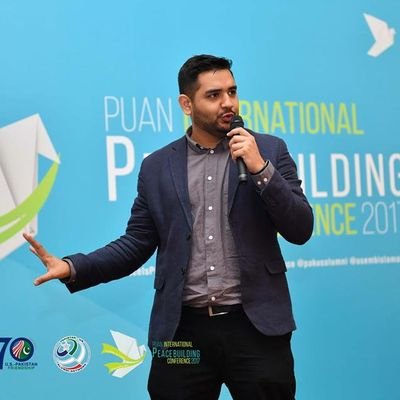

There’s a phrase in Urdu ‘Dukh Hota Hai’ which, loosely translated, means ‘It hurts’. The word ‘dukh’ relates to grief or an overwhelming sense of pain. It is not a word you would associate with comedy. And yet, that’s the exact word that Shehzad Ghias Shaikh has for the current state of affairs not only in Pakistan but throughout the world.
Perhaps it’s because, according to him, humor is a palatable way to talk about the issues we would rather be in denial about. Throughout his career, Shehzad has been vocal on issues relating to public health including mental health, child abuse, violence against women, and more recently, misinformation amidst the COVID19 pandemic.
Shehzad Ghias wears many hats – he is a lawyer, teacher, stand-up comedian, and podcaster. He has been using his online platform to raise awareness on these issues, at times at a great personal cost.
Throughout your career, you have highlighted so many social aspects that affect the well-being of our nation including mental health, violence against women, and, recently, COVID. Why did you feel the need to do so and how does humor help in getting your voice across?
That is a question I have asked myself many times. I have a voice and now that God has blessed me with a platform, I want to use it well. Living in a country like Pakistan compels me to be vocal. As human beings, I cant see how anyone can be unaffected by the news today, no matter where you are in the world. The issues you mentioned do come under public health – which automatically means they impact us collectively. But what do we do when people have no wish to acknowledge that they even exist?
Throwing facts and figures around is one thing. You can tell people that over 700 million women worldwide have faced violence (Facts and Figures: Ending Violence against Women | What We Do | UN Women – Headquarters, n.d.) or that over one billion young children face violence every year (Violence against Children, n.d.). But clearly, that doesn’t have the same impact.
I find humor as the best medium to get the message across. I guess it makes it more palatable for the audience. It is not just for laughs but to challenge mindsets, which is easier said than done.
Simply put, a good analogy is the ‘fool’ in Shakespeare’s King Lear. The fool is the jester in the King’s court. He may seem like a mere entertainer, but he has a degree over other courtiers in that he can dare to voice the truth when everyone else is busy buttering the monarch. He calls out hypocrisy when he sees it. For example, that famous line of his ‘When priests are more in words than matter’ highlights the religious hypocrisy in the king’s court.
At the end of the day, I would like to tell jokes, go home and live a good life. But at the end of the day, this country, and similar events around the world can break your heart in so many ways.
You made a video in which you called out some concerning messages being circulated on Whatsapp, especially the misconception that hot water could cure covid19. Most of us would laugh it off as absurd but why did you think it was important to raise that issue?
When I made that video, the COVID19 pandemic was just beginning in Pakistan. By then, I had a platform where I was regularly posting content. I felt it was important to combat misinformation this way. The problem is that I feel there’s a certain demographic of people, the older generation, who do take these messages seriously. Of course, it’s not just them. People would rather believe a comforting lie rather than face the possibility of taking the more arduous measures of social distancing and staying at home.
Moreover, the need to call out misinformation is even more necessary when public figures end up flaming the false narratives. Politicians and commentators, worldwide, have fueled this misinformation crisis instead of acting responsibly. In Pakistan, it is not surprising, given that polio workers are killed, and the widespread belief remains that polio vaccines cause infertility. However, given the acute nature of the COVID crisis, it was (and sadly still is) the need of the hour.
How do you ascertain the impact of your work? Is there a specific ‘metric’ you use or plan to use in the future?
Due to the subjective nature of my work, there’s no possible metric I can use. Social media metrics are limited and unreliable.
In many ways, I guess my work is unmeasurable. Perhaps it can be told in anecdotes. For example, I regularly get abused by people for highlighting child abuse and violence against women. Yet I have witnessed a change in a few of my followers. This one person went from cursing me to messaging me that he felt what I was saying was correct and needed to highlight.
Then again, it is not about people necessarily agreeing with you. It is about them engaging with you respectfully especially on sensitive topics. What defines us as a human race is our ability to communicate with each other. We need to be able to have difficult conversations. Perhaps that is not something measurable, but it is certainly important.
Violence against women and child abuse are major public health issues. Yet in most societies, people, especially women are told to look the other way as these are dubbed as ‘personal matters’. Why do you think this affects us collectively? And what feedback do you get when you raise your voice on these issues?
The answer may lie in the name itself – violence against women and child abuse. Who was not a child? Who has not interacted with women? If these issues were ‘personal’ there would not be so much suffering. In the case of child abuse, we see how unresolved trauma can be passed on to children, through generations. What goes on behind ‘closed doors’ crosses the line of being personal when the very people who are affected work for society in some way or another.
Also in Pakistan, I feel that most people have experienced this kind of trauma at some point in their lives and they perhaps never learned to deal with it thanks to the lack of mental health literacy. Hence, the need for victim-blaming and invalidating another’s pain. If a woman comes out and says she was physically abused, someone can very well call her a ‘drama’ and say they have had worse. That does not change the fact that abuse is abuse, regardless of the degree (How Pakistan Failed Its Women – The Diplomat, n.d.).
Nowadays more public figures are working collaboratively to increase awareness on health matters. What is your take on that and what do you think can be done to improve awareness?
I think whoever uses their platform to promote awareness is doing a great job. I will say this: governments need to fund their artists. Where scientists develop tools for the good of humanity, we help to create a voice for them. Our work, as long as it is for the common good, isn’t at all different.
Companies need to realize that they are not necessarily doing artists a favor by sponsoring them. It’s not just about a paycheck. It’s giving a voice to the voiceless under the cloak of entertainment. Perhaps that is what we need to do to challenge mindsets for now.
Facts and figures: Ending violence against women | What we do | UN Women – Headquarters. (n.d.). Retrieved August 6, 2021, from https://www.unwomen.org/en/what-we-do/ending-violence-against-women/facts-and-figures.
How Pakistan Failed Its Women – The Diplomat. (n.d.). Retrieved August 6, 2021, from https://thediplomat.com/2021/08/how-pakistan-failed-its-women/
Violence against children. (n.d.). Retrieved August 8, 2021, from https://www.who.int/news-room/fact-sheets/detail/violence-against-children
HPHR.org was designed by ComputerAlly.com.
Visit HPHR’s publisher, the Boston Congress of Public Health (BCPH).
Email communications@bcph.org for more information.

Click below to make a tax-deductible donation supporting the educational initiatives of the Boston Congress of Public Health, publisher of HPHR Journal.![]()